Risk Assessment in Mental Health Settings: A Comprehensive Overview
VerifiedAdded on 2023/06/07
|7
|725
|184
Report
AI Summary
This report provides an overview of risk assessment in mental health settings, focusing on enhancing the quality and security of healthcare services. It distinguishes the opportunities and conditions that expose patients to risk. The report details three types of risk assessment: unstructured clinical judgment, actuarial risk assessment, and structured professional judgment. It explores the approaches and evidence supporting each method, including their strengths and limitations. The report highlights the significance of these assessments in managing risks and improving patient outcomes. It references supporting studies by Briner & Manser (2013), Szmukler & Rose (2013), and Wand (2011), providing a comprehensive understanding of the topic.
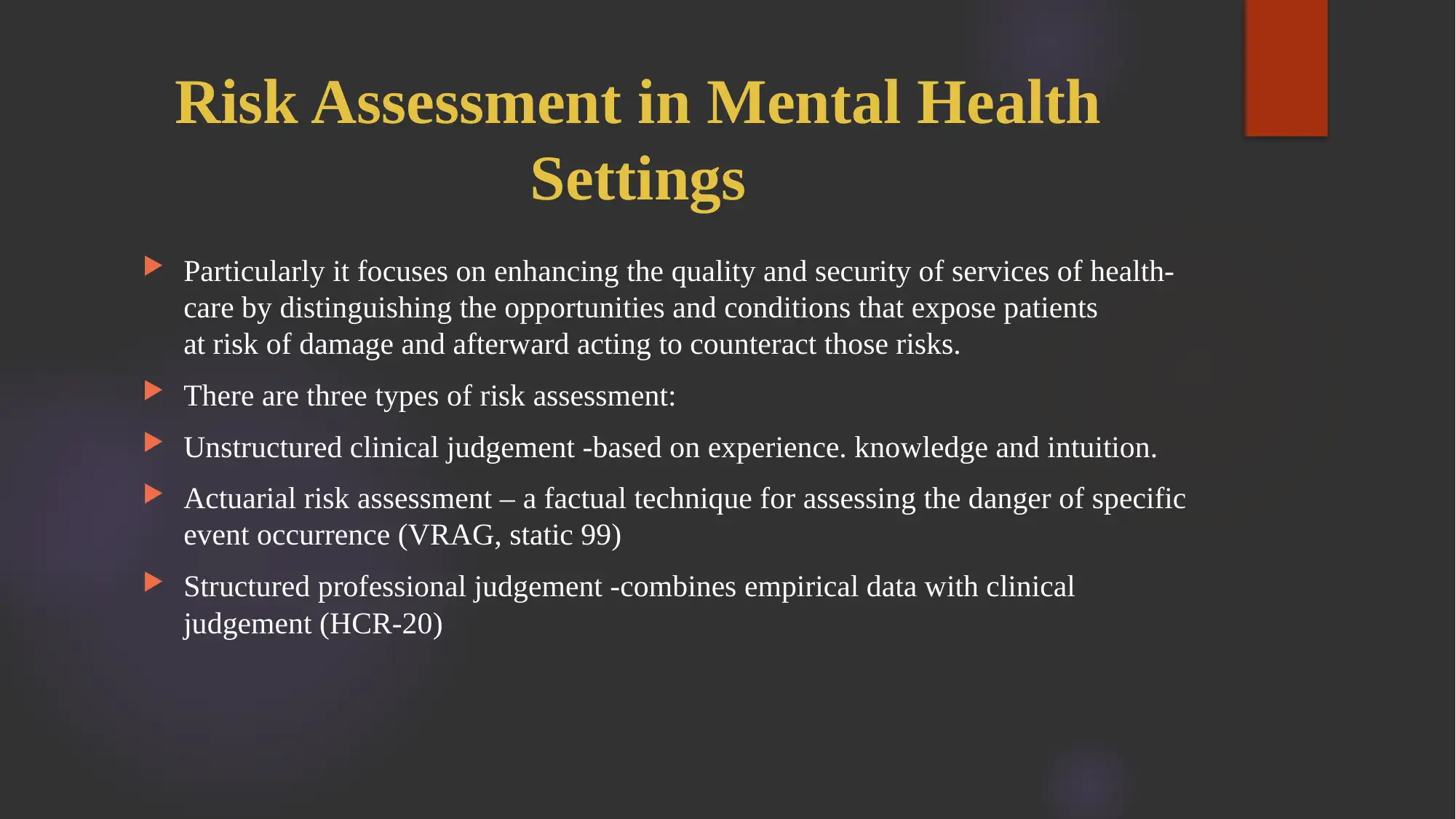
Risk Assessment in Mental Health
Settings
Particularly it focuses on enhancing the quality and security of services of health-
care by distinguishing the opportunities and conditions that expose patients
at risk of damage and afterward acting to counteract those risks.
There are three types of risk assessment:
Unstructured clinical judgement -based on experience. knowledge and intuition.
Actuarial risk assessment – a factual technique for assessing the danger of specific
event occurrence (VRAG, static 99)
Structured professional judgement -combines empirical data with clinical
judgement (HCR-20)
Settings
Particularly it focuses on enhancing the quality and security of services of health-
care by distinguishing the opportunities and conditions that expose patients
at risk of damage and afterward acting to counteract those risks.
There are three types of risk assessment:
Unstructured clinical judgement -based on experience. knowledge and intuition.
Actuarial risk assessment – a factual technique for assessing the danger of specific
event occurrence (VRAG, static 99)
Structured professional judgement -combines empirical data with clinical
judgement (HCR-20)
Paraphrase This Document
Need a fresh take? Get an instant paraphrase of this document with our AI Paraphraser
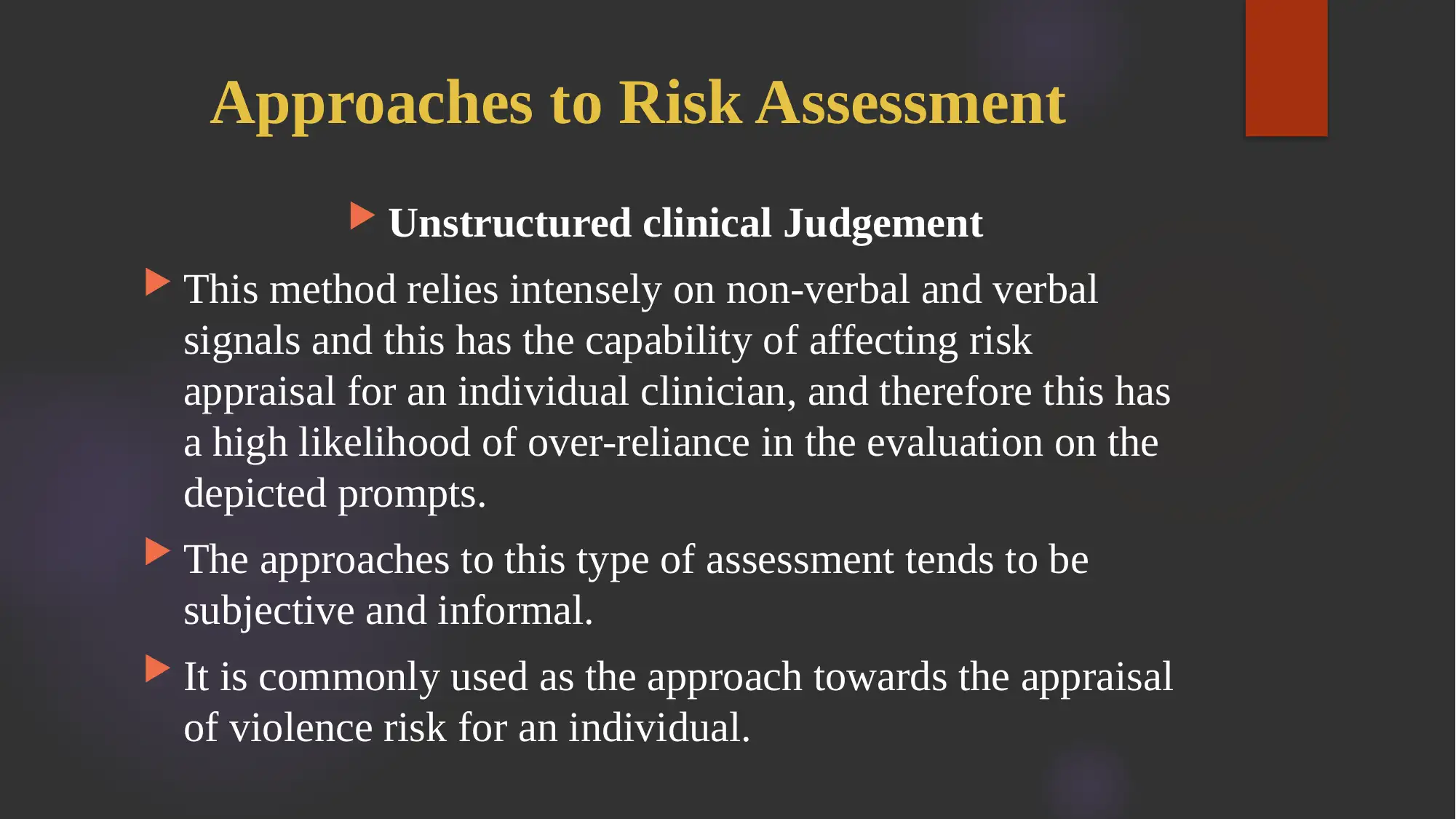
Approaches to Risk Assessment
Unstructured clinical Judgement
This method relies intensely on non-verbal and verbal
signals and this has the capability of affecting risk
appraisal for an individual clinician, and therefore this has
a high likelihood of over-reliance in the evaluation on the
depicted prompts.
The approaches to this type of assessment tends to be
subjective and informal.
It is commonly used as the approach towards the appraisal
of violence risk for an individual.
Unstructured clinical Judgement
This method relies intensely on non-verbal and verbal
signals and this has the capability of affecting risk
appraisal for an individual clinician, and therefore this has
a high likelihood of over-reliance in the evaluation on the
depicted prompts.
The approaches to this type of assessment tends to be
subjective and informal.
It is commonly used as the approach towards the appraisal
of violence risk for an individual.
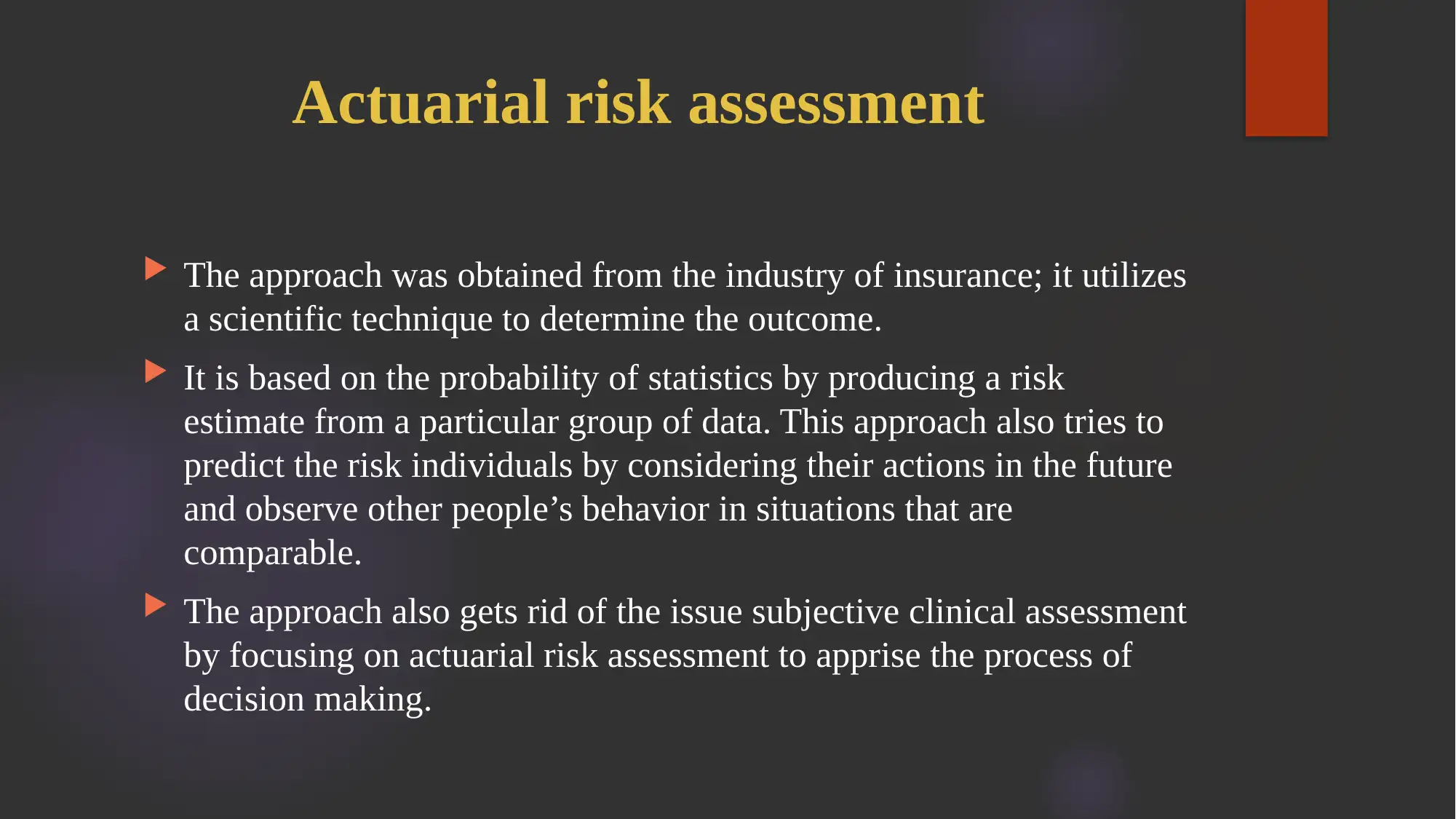
Actuarial risk assessment
The approach was obtained from the industry of insurance; it utilizes
a scientific technique to determine the outcome.
It is based on the probability of statistics by producing a risk
estimate from a particular group of data. This approach also tries to
predict the risk individuals by considering their actions in the future
and observe other people’s behavior in situations that are
comparable.
The approach also gets rid of the issue subjective clinical assessment
by focusing on actuarial risk assessment to apprise the process of
decision making.
The approach was obtained from the industry of insurance; it utilizes
a scientific technique to determine the outcome.
It is based on the probability of statistics by producing a risk
estimate from a particular group of data. This approach also tries to
predict the risk individuals by considering their actions in the future
and observe other people’s behavior in situations that are
comparable.
The approach also gets rid of the issue subjective clinical assessment
by focusing on actuarial risk assessment to apprise the process of
decision making.
⊘ This is a preview!⊘
Do you want full access?
Subscribe today to unlock all pages.

Trusted by 1+ million students worldwide
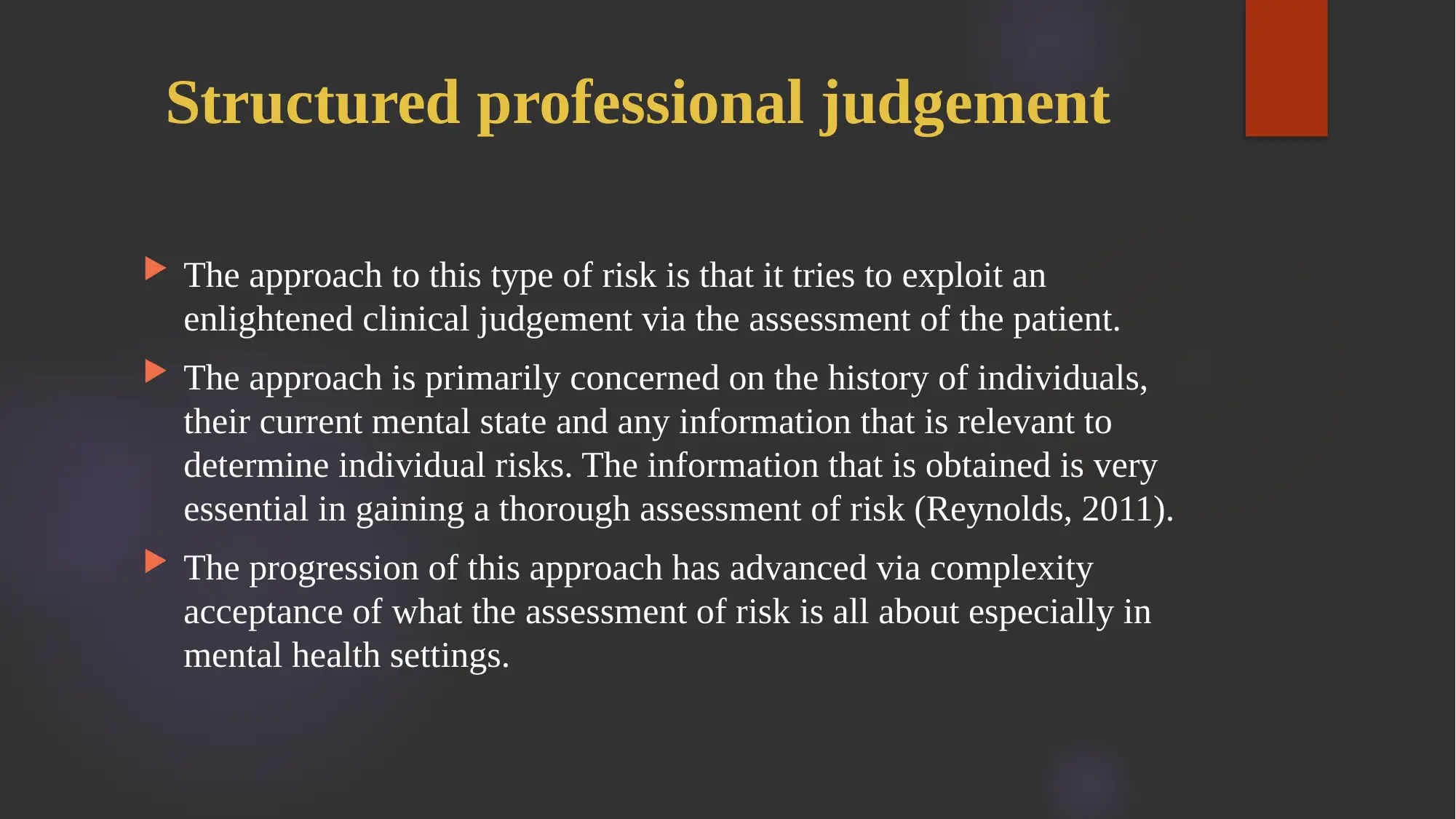
Structured professional judgement
The approach to this type of risk is that it tries to exploit an
enlightened clinical judgement via the assessment of the patient.
The approach is primarily concerned on the history of individuals,
their current mental state and any information that is relevant to
determine individual risks. The information that is obtained is very
essential in gaining a thorough assessment of risk (Reynolds, 2011).
The progression of this approach has advanced via complexity
acceptance of what the assessment of risk is all about especially in
mental health settings.
The approach to this type of risk is that it tries to exploit an
enlightened clinical judgement via the assessment of the patient.
The approach is primarily concerned on the history of individuals,
their current mental state and any information that is relevant to
determine individual risks. The information that is obtained is very
essential in gaining a thorough assessment of risk (Reynolds, 2011).
The progression of this approach has advanced via complexity
acceptance of what the assessment of risk is all about especially in
mental health settings.
Paraphrase This Document
Need a fresh take? Get an instant paraphrase of this document with our AI Paraphraser
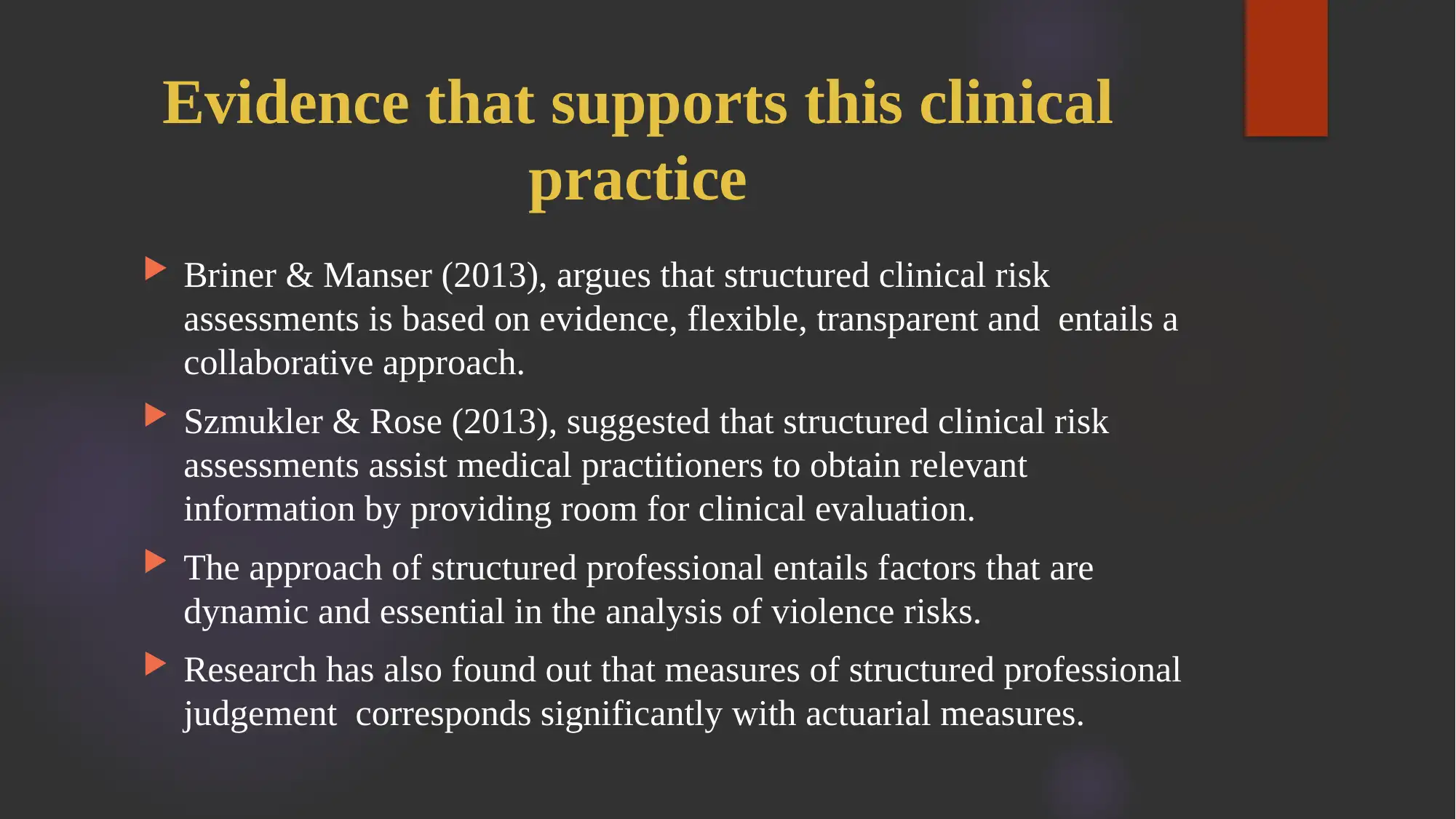
Evidence that supports this clinical
practice
Briner & Manser (2013), argues that structured clinical risk
assessments is based on evidence, flexible, transparent and entails a
collaborative approach.
Szmukler & Rose (2013), suggested that structured clinical risk
assessments assist medical practitioners to obtain relevant
information by providing room for clinical evaluation.
The approach of structured professional entails factors that are
dynamic and essential in the analysis of violence risks.
Research has also found out that measures of structured professional
judgement corresponds significantly with actuarial measures.
practice
Briner & Manser (2013), argues that structured clinical risk
assessments is based on evidence, flexible, transparent and entails a
collaborative approach.
Szmukler & Rose (2013), suggested that structured clinical risk
assessments assist medical practitioners to obtain relevant
information by providing room for clinical evaluation.
The approach of structured professional entails factors that are
dynamic and essential in the analysis of violence risks.
Research has also found out that measures of structured professional
judgement corresponds significantly with actuarial measures.
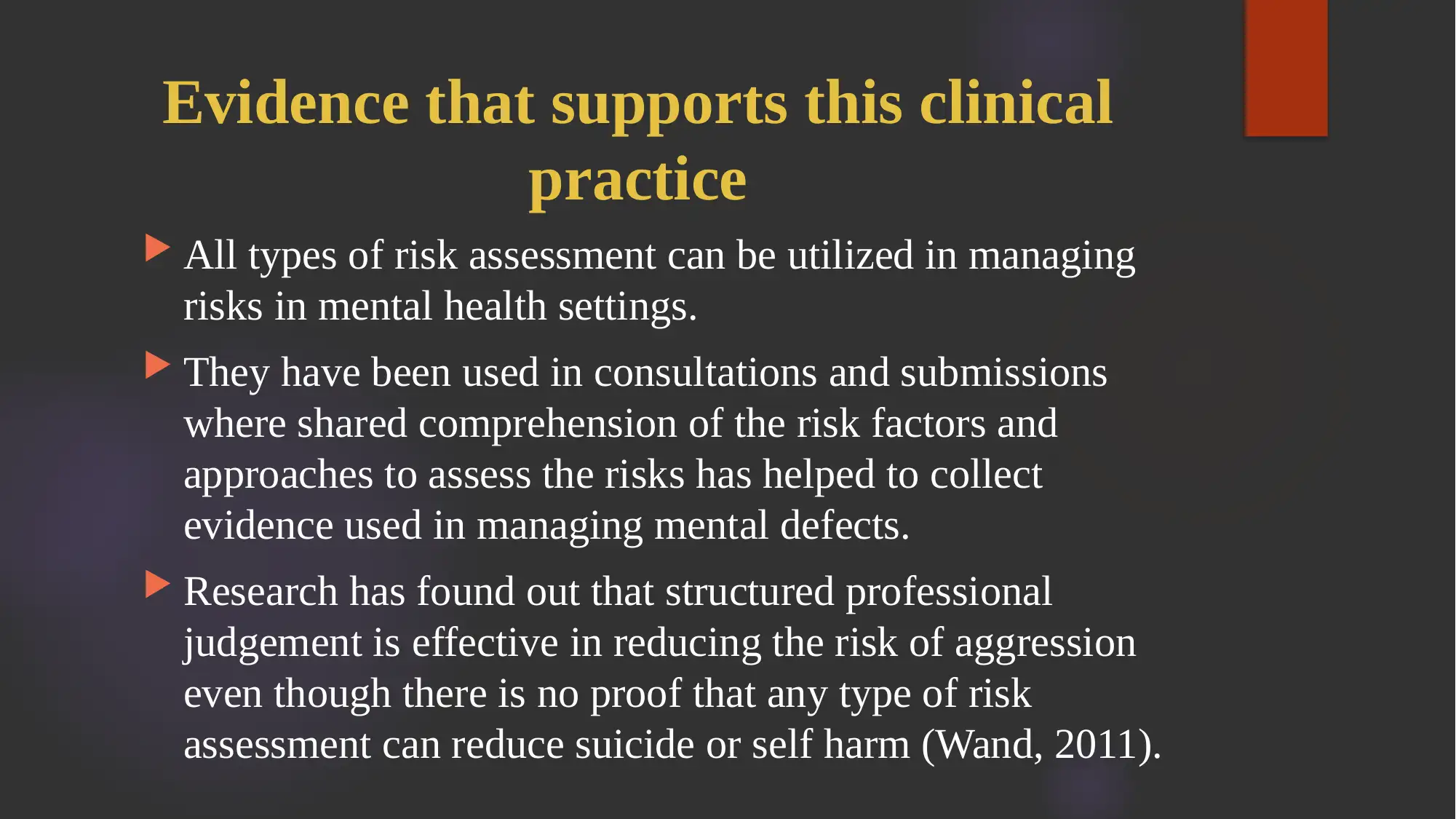
Evidence that supports this clinical
practice
All types of risk assessment can be utilized in managing
risks in mental health settings.
They have been used in consultations and submissions
where shared comprehension of the risk factors and
approaches to assess the risks has helped to collect
evidence used in managing mental defects.
Research has found out that structured professional
judgement is effective in reducing the risk of aggression
even though there is no proof that any type of risk
assessment can reduce suicide or self harm (Wand, 2011).
practice
All types of risk assessment can be utilized in managing
risks in mental health settings.
They have been used in consultations and submissions
where shared comprehension of the risk factors and
approaches to assess the risks has helped to collect
evidence used in managing mental defects.
Research has found out that structured professional
judgement is effective in reducing the risk of aggression
even though there is no proof that any type of risk
assessment can reduce suicide or self harm (Wand, 2011).
⊘ This is a preview!⊘
Do you want full access?
Subscribe today to unlock all pages.

Trusted by 1+ million students worldwide
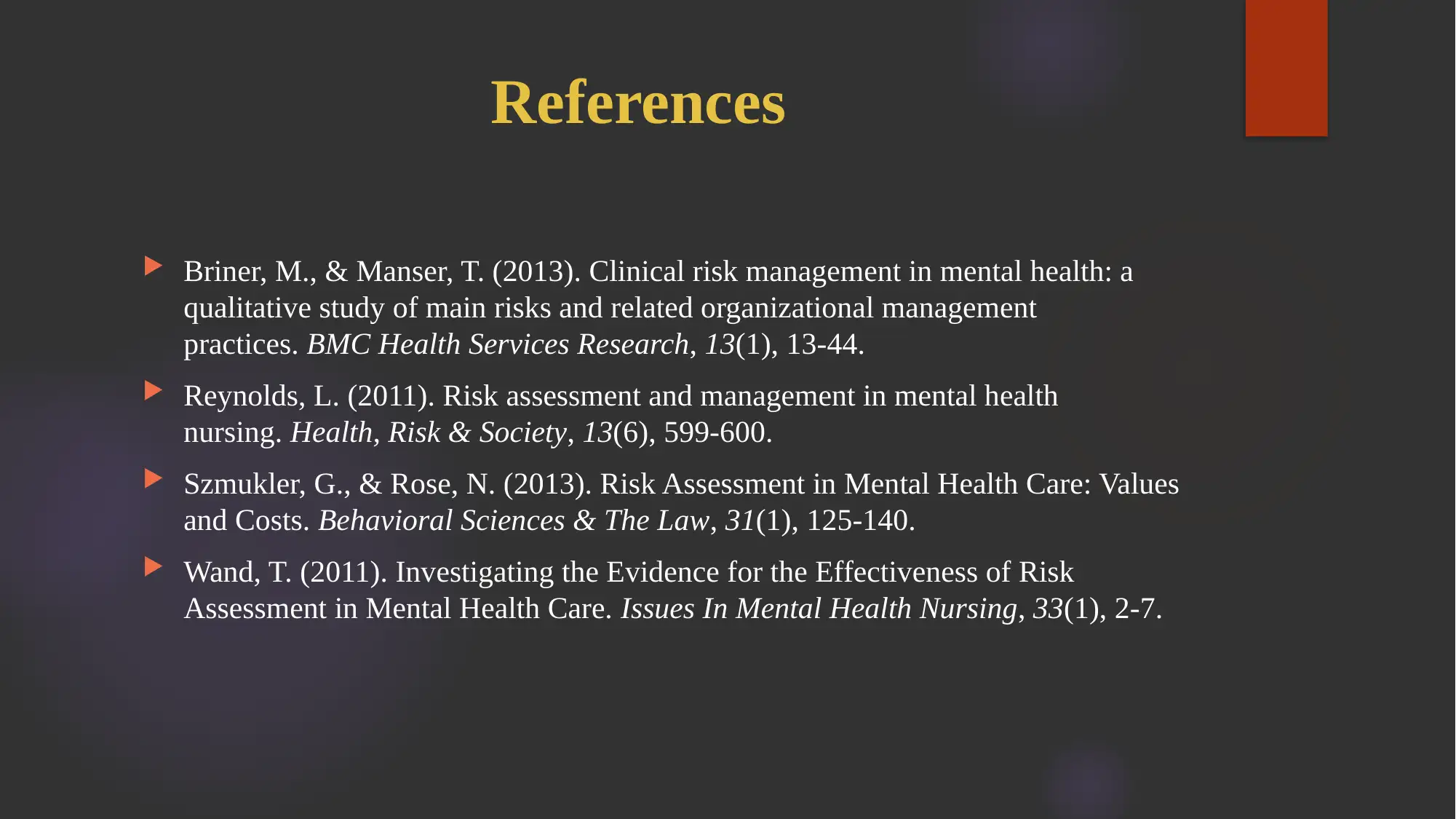
References
Briner, M., & Manser, T. (2013). Clinical risk management in mental health: a
qualitative study of main risks and related organizational management
practices. BMC Health Services Research, 13(1), 13-44.
Reynolds, L. (2011). Risk assessment and management in mental health
nursing. Health, Risk & Society, 13(6), 599-600.
Szmukler, G., & Rose, N. (2013). Risk Assessment in Mental Health Care: Values
and Costs. Behavioral Sciences & The Law, 31(1), 125-140.
Wand, T. (2011). Investigating the Evidence for the Effectiveness of Risk
Assessment in Mental Health Care. Issues In Mental Health Nursing, 33(1), 2-7.
Briner, M., & Manser, T. (2013). Clinical risk management in mental health: a
qualitative study of main risks and related organizational management
practices. BMC Health Services Research, 13(1), 13-44.
Reynolds, L. (2011). Risk assessment and management in mental health
nursing. Health, Risk & Society, 13(6), 599-600.
Szmukler, G., & Rose, N. (2013). Risk Assessment in Mental Health Care: Values
and Costs. Behavioral Sciences & The Law, 31(1), 125-140.
Wand, T. (2011). Investigating the Evidence for the Effectiveness of Risk
Assessment in Mental Health Care. Issues In Mental Health Nursing, 33(1), 2-7.
1 out of 7
Related Documents
Your All-in-One AI-Powered Toolkit for Academic Success.
+13062052269
info@desklib.com
Available 24*7 on WhatsApp / Email
![[object Object]](/_next/static/media/star-bottom.7253800d.svg)
Unlock your academic potential
Copyright © 2020–2026 A2Z Services. All Rights Reserved. Developed and managed by ZUCOL.





